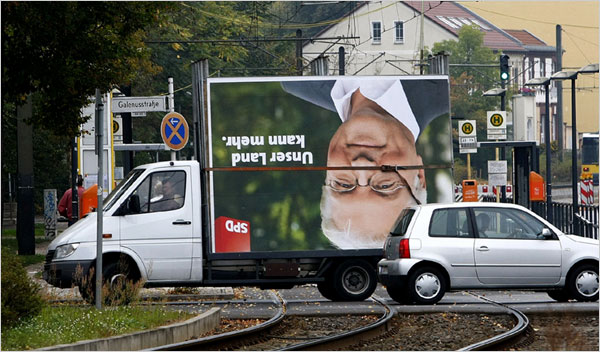Germany Swings to the Center-Right

German Chancellor Angela Merkel cruised to victory in federal elections on Sunday with enough votes to form a new center-right government with her preferred partner, the pro-business Free Democrats (FDP). The results follow a trend in which Socialist parties across Europe have seen sharp declines in their popularity.
Germany Swings to the Center-Right
Soeren Kern | PJ Media | September 27, 2009
German Chancellor Angela Merkel cruised to victory in federal elections on Sunday with enough votes to form a new center-right government with her preferred partner, the pro-business Free Democrats (FDP). The results follow a trend in which Socialist parties across Europe have seen sharp declines in their popularity.
Merkel’s conservative Christian Democratic Union (CDU) and its sister party, the Bavarian Christian Social Union (CSU), won nearly 34 percent of the votes, according to preliminary returns. At the same time, the classical liberal FDP won nearly 15 percent of the votes, the party’s best showing ever.
With a combined total of around 49 percent, the CDU/CSU and the FDP won a stable majority in Germany’s multiparty system. This will give Merkel the green light to ditch the awkward four-year-old “grand coalition” between the CDU/CSU and her party’s main rival, the center-left Social Democratic Party (SPD), and replace it with a center-right CDU/CSU-FDP coalition.
In fact, the SPD was by far the biggest loser on Sunday, winning only 23.5 percent of the votes, its worst performance since World War II. The result will cast the SPD into the opposition for the first time in 11 years. It will now work to rebuild itself and probably choose new leaders.
During the campaign, Merkel repeatedly stressed that she wanted to govern with the business-friendly FDP, which has been out of power since 1998, in order to cut taxes in a bid to further revitalize a German economy that has been hit hard by the global recession.
In the weeks leading up to the election, the SPD had registered a slight but significant uptick in its poll numbers, due in large measure to the exploitation of fears among German voters that the tax cuts promised by a CDU/CSU-FDP coalition would ultimately lead to a cut in social welfare benefits.
The SPD also tried, unsuccessfully, to boost its poll numbers by exploiting voter unease about the war in Afghanistan. In recent weeks, Steinmeier (as well as Germany’s sycophantic leftwing news media) had repeatedly raised the issue of Afghanistan, at one point going so far as to present a plan for completely withdrawing German troops from the country.
Moreover, and in stark contrast to Spain in March 2004, German voters were not intimidated by Islamist terrorists. Just one week before the election, Al Qaeda threatened the German electorate by demanding an end to Germany’s military mission in Afghanistan.
Nevertheless, arguably one of the most disturbing results of Sunday’s voting was the strong performance registered by the far-left Left Party, an alliance of former communists and disgruntled Social Democrats. In a sign of increasing polarization in German politics, the Left Party crossed the politically important threshold of 10 percent, by winning 12.1 percent of the votes, an increase of more than 3 points. The result will give the Left Party some 80 seats in the next parliament, an increase of almost 30 seats.
Under the blustery leadership of former SPD chancellor candidate Oskar Lafontaine (aka Red Oskar), who was once denounced as “the most dangerous man in Europe” by a British newspaper, the Left Party has established itself as one of the most notorious opposition groups in Germany.
Because of its strident and often anti-capitalist rhetoric, including its stated desire to bring about a return to East German socialism, the Left Party has been monitored by a German domestic intelligence agency, as well as by at least four German states. But that has not prevented the Left Party from enjoying a huge surge in popularity across the country.
In the eastern German state of Brandenburg, the Left Party nearly outperformed the SPD, winning 29.5 percent, compared with 30.8 percent for the SPD. In the western German state of Saarland (Lafontaine’s home state), the Left Party has also achieved near parity with the SPD.
In the final analysis, German voters have said they are happy with Merkel’s pragmatic, steady and low-key governing style, which is unlikely to change very much during the next four years.
Under a center-right coalition, economic policymaking will shift to the right, but not radically. Merkel’s new government will try to get control over a surging budget deficit (set to hit 6 percent of GDP in 2010) and cope with rising unemployment (which is hovering at around 8.3 percent).
During the campaign, Merkel promised to spur economic growth by simplifying the tax code, reforming the inheritance tax system, and providing across-the-board income tax cuts totaling 15 billion euros ($22 billion) over four years.
She also wants to extend the lifespan of Germany’s 17 nuclear power plants, which the government of former chancellor Gerhard Schroeder, caving in to demands from the environmentalist Green Party, ordered closed by 2021.
A CDU/CSU-FDP centre-right government, which last ruled Germany between 1982 and 1998 under Chancellor Helmut Kohl, will also seek to reduce the role of the state in the economy and pursue privatizations, such as that of rail operator Deutsche Bahn.
In foreign policy, a centre-right coalition will probably be more vocal in trying to block Turkey’s bid to join the European Union. Merkel says she favours a “privileged partnership” for Ankara that stops short of full membership. Merkel has also said she will keep German troops in Afghanistan.
Published by Pajamas Media on September 27, 2009
Soeren Kern is Senior Fellow for Transatlantic Relations at the Madrid-based Grupo de Estudios Estratégicos / Strategic Studies Group



